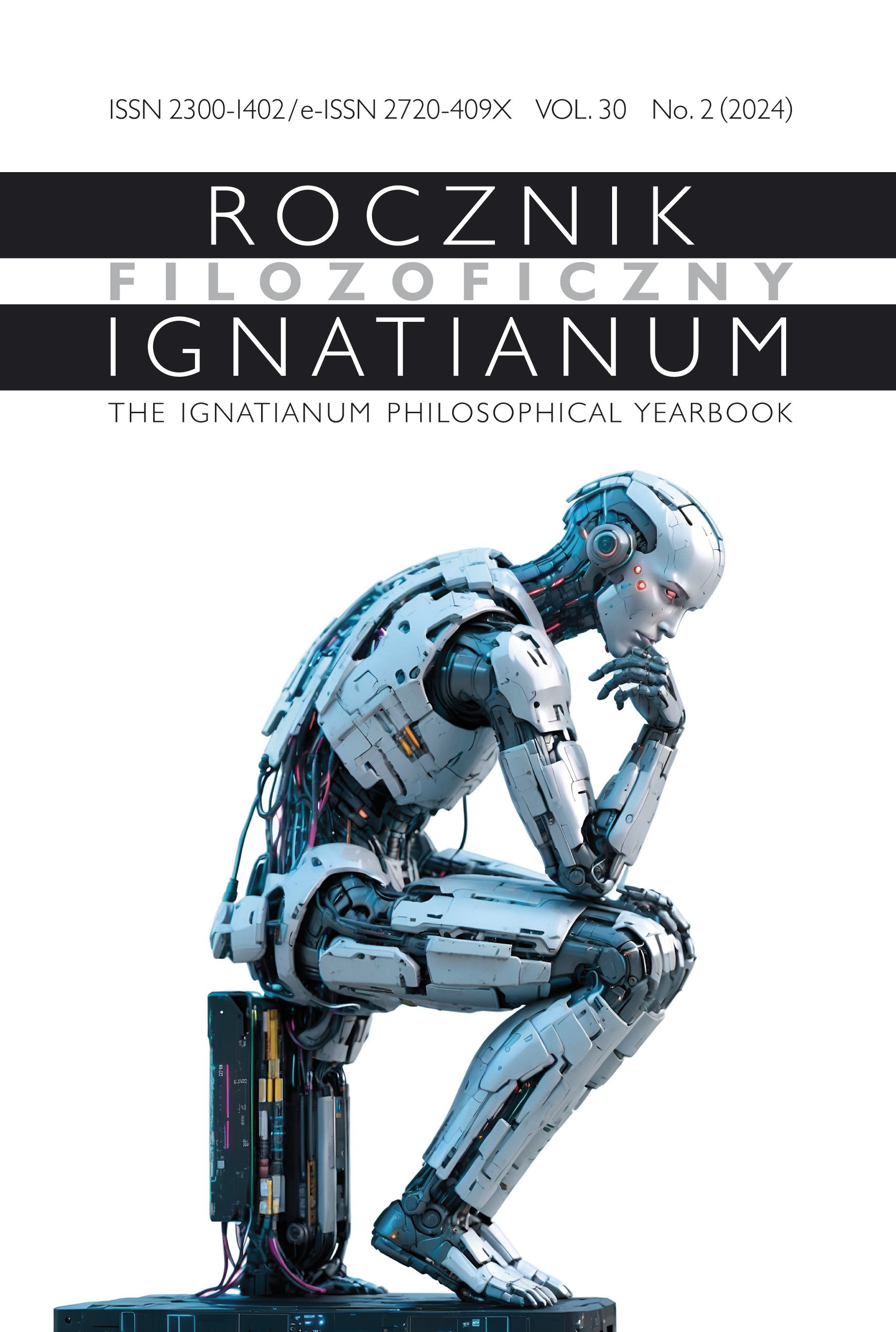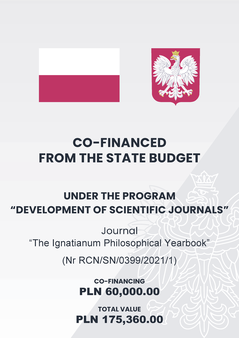Talking About God in the Digital Age
Abstract
Digitization and its associated new technologies have dynamically entered many areas of our lives—both public (administration, economy, military, communications, education, etc.) and private. A symptomatic indicator of this expansion is the increasingly widespread use of weak (narrow) artificial intelligence (Artificial Narrow Intelligence – ANI) and intense work on strong (general) artificial intelligence (Artificial General Intelligence – AGI), which remains a particular interest of transhumanism. According to transhumanists, AGI would be the first step toward creating an artificial superintelligence (Artificial Superintelligence – ASI) that would surpass human intellectual capabilities leading to the emergence of an “information singularity” (singularity) that could be attributed divine attributes. In this article, I discuss whether transhumanism is capable of eliminating God and replacing Him with some form of artificial intelligence (with its digital superconsciousness) and whether, in the digital age, Christian truths of faith risk becoming outdated. I advocate for the legitimate discussion of God and the truths of faith about creation, redemption, and salvation in a digital society. I believe that the culture of the digital era not only does not harm the life of faith but can stimulate a deeper understanding of its truths.
References
Bauman Zygmunt, Postmodernity and its Discontents (Cambridge: Polity, 1997). Boden Margaret A., AI: Its Nature and Future (Oxford: Oxford University Press, 2016).
Bremer Józef, „Neuroteologia: religijność w neuronach”, w: idem, Interdyscyplinarne znaczenie neuronauk (Kraków: Wydawnictwo Naukowe Akademii Ignatianum w Krakowie, 2016), 13–40.
Bremer Józef, Życie jest warte przeżycia. Z Koheletem w drodze (Kraków: Wydawnictwo M, 2023).
Flasiński Mariusz, Wstęp do sztucznej inteligencji (Warszawa: Wydawnictwo Naukowe PWN, 2011).
Geraci Robert M., Apocalyptic AI: Visions of Heaven in Robotics, Artificial Intelligence, and Virtual Reality (New York: Oxford University Press, 2010).
Herzfeld Noreen, The Artifice of Intelligence: Divine and Human Relationship in a Robotic Age (Minneapolis: Fortress Press, 2023).
Last Cadell, Global Brain Singularity: Universal History, Future Evolution and Humanity’s Dialectical Horizon (Cham: Springer 2020).
Moravec Hans, Mind Children. The Future of Robot and Human Intelligence (Cambridge, MA: Harvard University Press, 1988).
Polanyi Michael, Personal Knowledge: Towards a Post-Critical Philosophy (Chicago: University of Chicago Press, 1958).
Polanyi Michael, The Tacit Dimension (Garden City, NY: Doubleday and Co., 1966).
Św. Tomasz z Akwinu, Suma teologiczna, t. 2, O Bogu, tłum. Pius Bełch OP (Londyn: Nakładem Katolickiego Ośrodka Wydawniczego „Veritas”, 1977), cz. II, 1, 13–26.
Bejze Bohdan, „Analogia proporcjonalności i jej odmiany. Z zagadnień metafizycznej teorii analogii”, Roczniki Filozoficzne 10 (1) (1962): 105–118.
Bieńkowski Paweł, „30 lat telefonii komórkowej w Polsce”, Przegląd Elektrotechniczny 98 (12) (2022): 225–228, http://pe.org.pl/articles/2022/12/51.pdf (dostęp: 4.11.2023).
Damour Franck, „Le transhumanisme est-il soluble dans la religion?”/„Can Transhumanism be Explained by or Reduced to Religion?”, Revue D’ethique et de Theologie Morale 302 (2) (2019): 11–27; tłum. ang. https://www.cairnint.info/journal-revue-d-ethique-et-de-theologie-morale-2019-2-page-11. htm (dostęp: 4.11.2023).
Flasiński Mariusz, „Których technologii należy się bać?”, Teofil 1 (40) (2023): 124–135.
Kozhevnikova M., Karpova S., „Ambiwalentny obraz psa w robotyce”, Zoophilologica. Polish Journal of Animal Studies 1 (7) (2021): 1–12.
Langford Michael D., „A Theological Framework for Reflection on Artificial Intelligence”, SPU Works 171 (2022): 70–94, https://digitalcommons.spu.edu/works/171 (dostęp: 4.11.2023).
Pauluk Dorota, „Pandemia COVID-19 i (nie)wykorzystany potencjał edukacyjny”, Horyzonty Wychowania 20 (53) (2023): 39–48.
Viik Tõnu, „Falling in Love with Robots: a Phenomenological Study of Experiencing Technological Alterities”, Paladyn, Journal of Behavioral Robotics 11 (1) (2020): 52–65.
von der Assen Louisa, „Digitalization as a Provider of Sustainability? – The Role and Acceptance of Digital Technologies in Fashion Stores”, Sustainability 15 (5), art. 4621 (2023).
Ye Frank Tian-Fang, Gao Xiaozi, Sin Kuen-Fung, Yang Lan, „Remote learning and mental health during the societal lockdown: a study of primary school students and parents in times of COVID-19”, BMC Public Health 23 (1), art. 1106 (2023).
Zhu Guangming, Jiang Bin, Tong Liz, Xie Yuan, Zaharchuk Greg, Wintermark Max, „Applications of Deep Learning to Neuro-Imaging Techniques”, w: Frontiers in Neurology 10, art. 869 (2019).
Kozłowski Maciej, „Historia Internetu w Polsce”, w: Społeczeństwo informacyjne. Doświadczenie i przyszłość, red. Grzegorz Bliźniuk, Jerzy S. Nowak (Katowice: Polskie Towarzystwo Informatyczne. Oddział Górnośląski, 2006), 89–98, https://delibra.bg.polsl.pl/dlibra/publication/27164/edition/24504/content (dostęp: 4.11.2023).
Poczobut Robert, „Ulepszanie procesów poznawczych za pomocą artefaktów”, w: Ulepszanie poznawcze człowieka. Perspektywa filozoficzna, red. Piotr Duchliński, Grzegorz Hołub (Kraków: Wydawnictwo Naukowe Akademii Ignatianum w Krakowie, 2021), 145–165.
Cairn’s Dossiers „Transhumanism: Prospects and Risks” (Cairn.info, 2022), https://www.cairn-int.info/dossiers-2022-5-page-1.htm (dostęp: 4.11.2023). Chaitin Daniel, „Elon Musk: Artificial intelligence a ‘fundamental risk to the existence of human civilization’” (Washington Examiner, 2017), https://www. washingtonexaminer.com/elon-musk-artificial-intelligence-a-fundamental-risk-to-the-existence-of-human-civilization (dostęp: 4.11.2023).
Stone Zara, „Everything You Need To Know About Sophia, The World’s First Robot Citizen” (Forbes, 7.11.2017), https://www.forbes.com/sites/zaras- tone/2017/11/07/everything-you-need-to-know-about-sophia-the-worldsfirst-robot-citizen/ (dostęp: 4.11.2023).
Copyright (c) 2024 Ignatianum University in Cracow

This work is licensed under a Creative Commons Attribution 4.0 International License.
The Yearbook only accepts materials for publication that are free of all conflicts of interest, and that in no way involve conflicts over authorship, copyright, etc. The Editors will take action against any cases of plagiarizing, ghostwriting1, guest/honorary authorship2, etc. Where co-authored work is concerned, the Author listed first is expected to take responsibility for the submission, and is required to make clear the contributions of all of the Co-Authors involved. In the event of the publication owing its existence to funding dedicated to this purpose, this fact should be made clear: e.g. in any note of thanks/acknowledgement, or in a footnote, etc. Explicit notification should be given of any form of reprinting, with the appropriate evidence of permission to publish being furnished as required. Any impropriety on the part of Authors/Reviewers risks exposing them to appropriate responses from the relevant institutions.
______
1 This term refers to instances of a person who has made an essential contribution being omitted from the list of authors, or from notes conveying gratitude and/or acknowledgement.
2 This occurs when a person who has made either an insignificant contribution or no contribution at all nevertheless appears on the list of authors.





